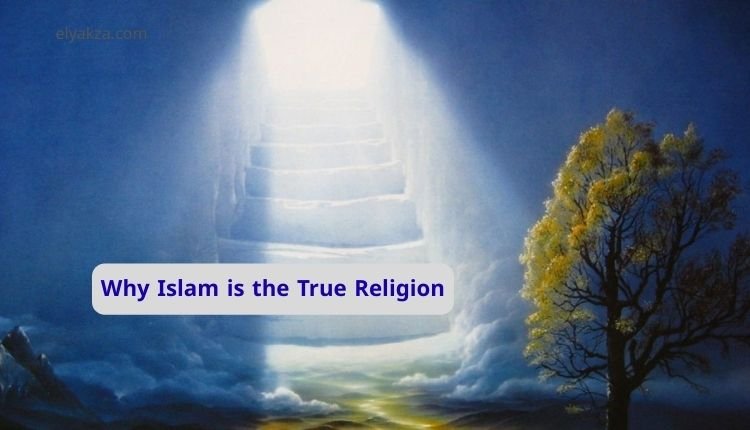Islam is considered by its followers to be the final and complete revelation of God’s will to humanity. It is a religion that has been practiced for over 1,400 years and continues to guide more than 1.8 billion Muslims worldwide. The question of why Islam is the true religion is often posed by both Muslims and non-Muslims alike. In this article, we will explore the reasons that affirm the truth of Islam, providing an understanding of its beliefs, practices, and why many people find it to be the true path to understanding the Creator and achieving ultimate peace.
قائمة المحتويات
The Concept of Tawhid: The Oneness of God
One of the foundational principles of Islam is the concept of Tawhid, which refers to the absolute oneness of God. This is central to the Islamic faith, as it emphasizes that there is only one Creator, and He alone is worthy of worship. Tawhid is not just about monotheism; it is about acknowledging God’s unique attributes, such as His power, knowledge, and mercy.
God’s Absolute Uniqueness
In Islam, God (Allah in Arabic) is seen as absolutely unique and transcendent. He is not bound by the limitations of time or space. Unlike other religions that may associate divinity with other beings or forces, Islam asserts that God has no partners, no children, and no equals. This purity of belief in one God is the core of Islamic theology and sets it apart from other religions.
The Quran as the Unaltered Word of God
The Quran, Islam’s holy book, is viewed as the literal word of God revealed to the Prophet Muhammad (PBUH) over a span of 23 years. The Quran remains unchanged since it was revealed and serves as a complete guidance for humanity. Unlike many religious texts that have undergone changes and alterations over time, the Quran is considered to be preserved in its original form, offering a unique claim of authenticity among world religions.
The Prophethood of Muhammad (PBUH)

Islam teaches that Muhammad is the final prophet sent by God to guide humanity. His life, his actions, and his teachings serve as a model for Muslims to follow. Muhammad (PBUH) is considered the Seal of the Prophets, meaning no other prophets will come after him.
The Perfect Example of a Human Being
The Prophet Muhammad (PBUH) is revered by Muslims as the perfect human being who exemplified the ideal character and conduct in all aspects of life. His honesty, kindness, compassion, humility, and dedication to justice made him a role model for Muslims and non-Muslims alike.
The Quran and the Hadiths
While the Quran serves as the divine revelation, the Hadiths are the sayings, actions, and approvals of Prophet Muhammad (PBUH). Together, the Quran and the Hadith form the complete framework of Islamic teachings. The Hadiths offer detailed insight into the Prophet’s way of life and guidance on how Muslims should live in accordance with God’s will.
“Discover here the scientific miracle of the Holy Quran – God’s Book to you“
Islamic Teachings on the Afterlife: A Promise of Eternal Reward
Islam emphasizes the reality of the afterlife, which is central to understanding the true path of the religion. The belief in the Day of Judgment and the eternal life after death provides Muslims with a sense of purpose and responsibility in this world.
The Day of Judgment
Islam teaches that every person will be resurrected on the Day of Judgment, where their deeds will be weighed. Those who have followed God’s guidance and lived righteous lives will be rewarded with eternal paradise (Jannah), while those who rejected the truth and lived unjustly will face punishment in hell (Jahannam). This concept of divine justice is key to understanding why Islam views itself as the true path.
A Reward for Righteous Actions
The Islamic understanding of the afterlife is not only about the fear of punishment but also about the hope of eternal rewards. Muslims are encouraged to engage in good deeds, help others, and live morally upright lives, as these actions will be rewarded by God in the hereafter.
The Universality of Islam’s Message

Islam’s message is universal and meant for all of humanity, regardless of race, ethnicity, or background. The Quran explicitly mentions that Islam is a religion for all people, and its message is a continuation of the messages brought by previous prophets, including Adam, Noah, Abraham, Moses, and Jesus.
Islam’s Emphasis on Universal Brotherhood
One of the key aspects of Islam is the emphasis on ummah, or the global Muslim community, which is united by the shared belief in one God and adherence to the teachings of the Prophet Muhammad (PBUH). The concept of ummah encourages Muslims to support one another and work together for the common good, transcending racial, national, and cultural boundaries.
Respect for Previous Religions
While Islam believes in the finality of its message, it also acknowledges the validity of previous scriptures and prophets. Islam respects and honors figures such as Moses and Jesus (peace be upon them) and believes that the teachings they brought were originally from God, but over time, their messages were distorted or misinterpreted. Islam sees itself as the final and most complete version of these earlier revelations.
Islamic Law (Sharia): A Complete Way of Life
Sharia, or Islamic law, is a comprehensive system that guides all aspects of a Muslim’s life, from spiritual practices to social interactions, economic transactions, and personal conduct. Far from being a rigid or harsh set of rules, Sharia is designed to promote justice, mercy, and the welfare of society.
Justice and Mercy in Sharia
Sharia is based on the principles of justice and mercy. Its laws are meant to protect the rights of individuals, maintain social harmony, and provide fair treatment for all members of society. The Islamic legal system emphasizes rehabilitation over punishment and encourages forgiveness and reconciliation.
Islamic Ethics and Social Welfare
Islam encourages social justice, charity, and the well-being of all people, particularly the poor and oppressed. The obligation of zakat, a form of almsgiving, is one of the Five Pillars of Islam and is a direct command to assist those in need, thus promoting social equity and welfare.
“From here discovered Islam more deeply“
Scientific Miracles in the Quran
One of the remarkable aspects of the Quran is its references to scientific phenomena, many of which were unknown to humanity at the time of its revelation. These references are often seen as a sign of the Quran’s divine origin, as they align with modern scientific discoveries.
The Development of the Human Embryo
The Quran describes the stages of human development in the womb in remarkable detail, which aligns with what modern science has discovered about embryology. This is often cited as one of the miracles of the Quran, as these descriptions were revealed long before the advent of modern medical science.
The Expanding Universe
The Quran also contains references to the expanding universe, which is a concept that was discovered by astronomers in the 20th century. The verse in the Quran that mentions the expansion of the heavens is often seen as another indication of the divine knowledge contained within the text.
Why Islam Offers the Path to Peace
Ultimately, Islam is seen by its followers as the true religion because it provides a complete path to peace—both internally and externally. Through submission to God’s will, Muslims believe they can achieve peace in their hearts, peace within their families, and peace in society.
Inner Peace Through Submission to God
The word “Islam” itself means submission or surrender to the will of God. By accepting God’s guidance and living according to His commands, Muslims find tranquility and inner peace. This peace is not temporary; it is a lasting peace that comes from living in harmony with the Creator.
Peace and Justice in Society
Islam emphasizes peace, justice, and the protection of human dignity. By following the principles of justice, fairness, and compassion, Islam offers a solution to the problems of conflict, inequality, and injustice that plague societies around the world.
“Read Also: الرد على الإلحاد“
“Read Also: التوحيد في الدعاء“
Why Islam is the True Religion: Conclusion
In conclusion, Islam offers a complete and rational path to understanding the Creator, living a moral life, and achieving peace in both this world and the afterlife. With its emphasis on the oneness of God, the prophethood of Muhammad (PBUH), the Quran as the unchanged word of God, and a legal system that promotes justice and mercy, Islam is considered by its followers to be the true religion for humanity. For Muslims, Islam is not just a set of beliefs, but a complete way of life that leads to ultimate peace and fulfillment.
يعد كمال علي كاتبًا متخصصًا في الشؤون الإسلامية، حيث يقدم محتوى مميزًا يجمع بين الأسلوب السهل والطرح العميق. يكتب عن العقيدة، الفقه، السيرة النبوية، والتربية الإسلامية، مع الحرص على تبسيط المفاهيم الدينية لتكون في متناول الجميع.
يحرص كمال على أن تكون مقالاته مصدرًا للوعي الديني الصحيح، بعيدًا عن التعقيد أو الغموض، مع التركيز على إبراز سماحة الإسلام ووسطيته. كما يربط بين التعاليم الإسلامية والحياة اليومية ليجعل القارئ أكثر قدرة على تطبيق القيم الدينية في واقعه المعاصر.
إلى جانب ذلك، يولي اهتمامًا بمواضيع الشباب والأسرة والتحديات التي يواجهها المسلم المعاصر، مما يجعل كتاباته شاملة ومؤثرة.

